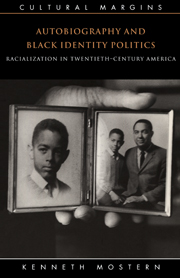Book contents
- Frontmatter
- Contents
- Acknowledgments
- Part one: Theorizing race, autobiography, and identity politics
- 1 What is identity politics? Race and the autobiographical
- 2 African-American autobiography and the field of autobiography studies
- Part two: The politics of Negro self-representation
- Part three: The dialectics of home: gender, nation, and blackness since the 1960s
- Notes
- Works cited
- Index
2 - African-American autobiography and the field of autobiography studies
Published online by Cambridge University Press: 02 December 2009
- Frontmatter
- Contents
- Acknowledgments
- Part one: Theorizing race, autobiography, and identity politics
- 1 What is identity politics? Race and the autobiographical
- 2 African-American autobiography and the field of autobiography studies
- Part two: The politics of Negro self-representation
- Part three: The dialectics of home: gender, nation, and blackness since the 1960s
- Notes
- Works cited
- Index
Summary
Only the techniques of the Bildungsroman could enable us to show how collective crisis and personal crisis provide each other with a mutual opportunity, how political revision is accompanied by personal regeneration, attested by the changes in vestimentary and cosmetic symbolism which consecrate a total commitment to an ethico-political vision of the social world, erected into the principle of a whole lifestyle, private as much as public.
Pierre BourdieuIn spite of the fact that autobiography is impossible, this in no way prevents it from existing. Perhaps, in describing it, I in turn took my desire for reality; but what I had wanted to do, was to describe this reality in its reality, a reality shared by a great number of authors and readers.
Philippe LejeuneA schema for reading contemporary theories of autobiography
Scholars who take autobiography as their subject necessarily position themselves according to two distributive axes: an axis of referentiality, and an axis of subjectivity. “Referentiality” refers to the question of whether autobiography is to be understood as representing, or as nonrepresentational with regard to, a real world external to the text. “Subjectivity” refers to discussions of the position of the speaking subject, the “I” (or, in those few cases without “I”, the point of view) which narrates the autobiographical text – its social positioning and construction, its number, its autonomy, its relationship to other subject-positions. No definition of autobiography is possible without some explicit or implicit position along each of these axes. precise definition of any given writer does not necessarily fall neatly into one side of an issue. But most authors choose to analyze particular autobiographies according to their preferences within the space of the grid.
- Type
- Chapter
- Information
- Autobiography and Black Identity PoliticsRacialization in Twentieth-Century America, pp. 28 - 54Publisher: Cambridge University PressPrint publication year: 1999



